

Tunisian president has ‘nightmares’ of yet another revolution. The Disintegrating Fabric of Tunisian Politics: The Niqab Ban and Tunisian Flag Desecration at Manouba University.
Tunisia: A revolutionary model - Empire. Tunisia: Reading... Tunisia. The Tunisian economy... Jadaliyya - Tunisia. Trente ans de recherche sur Tunis et les grandes villes tunisiennes Mar 21 2014by Olivier Legros Recension: Morched Chabbi, L'urbain en Tunisie.
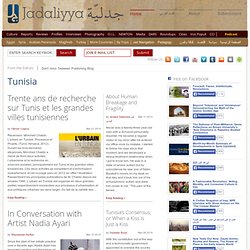
Processus et Projets, (Tunis: Nirvana, 2012). Durant les trois dernières décennies, Morched Chabbi a mené de front deux activités: l’urbanisme et la recherche en sciences sociales, principalement sur Tunis et les grandes villes tunisiennes. Ces deux activités se complètent et s’enrichissent mutuellement, et cet ouvrage paru en 2012 en offre l’illustration. Keep Reading » In Conversation with Artist Nadia Ayari Mar 10 2014by Maymanah Farhat Since the start of her artistic practice over a decade ago, Nadia Ayari has engaged painting and the history of its development with marked intensity and seriousness. Keep Reading » Jihadism and Contraband on Tunisia's Borders Keep Reading » Nouveau Webdoc: Au centre de Tunis: géographies de l’espace public après une révolution Keep Reading »
Tunisia's Student Salafis - By Monica Marks. Giggling over a communal pot of couscous, the girls swap stories and take turns pushing each other across the room on wheely chairs.

Douha Rihi, 20, a German language major, wants to study abroad in Berlin. Salafi Trouble in Tunisia's Transition. One of the prominent developments in the aftermath of the fallen dictatorship in Tunisia was the resurgence in the public sphere of groups with Salafi backgrounds.
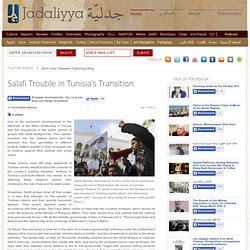
Their sudden incursion into the political arena and the polemics that they generated in different political matters resulted in their increased use of violence against other political and social actors. These actions have left large segments of Tunisian society skeptical about the outcome of the country’s political transition. Nothing in Tunisia’s post-authoritarian era seems to be deterring these religious zealots from challenging the rule of law and the state power. Nowadays, Salafi groups show off their power in a way that infringes on the sanctity of Tunisian citizens and their recently recovered freedom.
Their modus operandi varies in accordance with their goals. Tunisia and the New Arab Media Space. An interesting discussion has already broken out over whether Tunisia should be considered a "Twitter Revolution" -- a far more interesting and relevant discussion than whether it was a "WikiLeaks Revolution" (it wasn't).
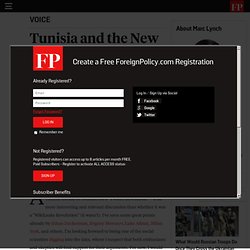
I've seen some great points already by Ethan Zuckerman, Evgeny Morozov, Luke Allnut, Jillian York, and others. I'm looking forward to being one of the social scientists digging into the data, where I suspect that both enthusiasts and skeptics will find support for their arguments. Political Pluralism breaks out in Tunisia. Tunisia’s election outcome gives 41% to the Muslim fundamentalist party Al-Nahda.
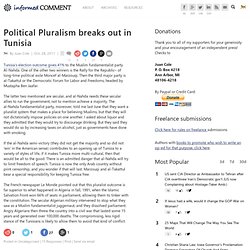
One of the other two winners is the Rally for the Republic– of long-time political exile Moncef al-Marzouqi. Then the third major party is al-Takattul or the Democratic Forum for Labor and Freedoms, headed by Mustapha Ben Jaafar. The latter two mentioned are secular, and al-Nahda needs these secular allies to run the government, not to mention achieve a majority.
The al-Nahda fundamentalist party, moreover, told me last June that they want a pluralist system that makes a place for believing Muslims, but that they will not dictatorially impose policies on one another. I asked about liquor and they admitted that they would try to discourage drinking. Tunisia's Election Results and the Question of Minorities. Now that the votes have been tallied and the victors of Tunisia’s 23 October elections have been announced, the country’s Constituent Assembly is finally beginning to take shape.
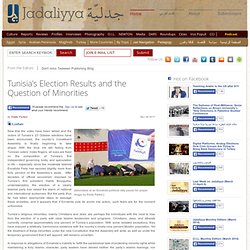
With the blue ink still fading from Tunisian voters’ index fingers, all eyes are fixed on the composition of Tunisia’s first independent governing body, and speculation is rife – especially since the moderate Islamist Ennahda Party has secured slightly more than forty percent of the Assembly’s seats. After decades of official secularism imposed by Tunisia’s first president Habib Bourguiba, understandably, the election of a clearly Islamist party has raised the alarm of national and international audiences. But the party thus far has taken appropriate steps to assuage these anxieties, and it appears that if Ennahda puts its words into action, such fears are for the moment unfounded. Le Kef Is Still on Fire: A Mountaintop View of the Anniversary of the Tunisian Revolution. Le Kef, Tunisia: On the first anniversary of the Tunisian revolution, international attention largely focused on Avenue Bourguiba in downtown Tunis and on Sidi Bouzid, where the self-immolation of Mohammed Bouazizi on 17 December 2010 is said to have ignited the Arab Spring.
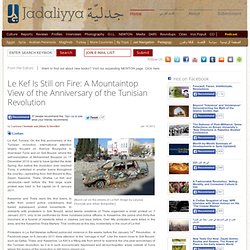
But before the revolution ever reached Tunis, it unfolded in smaller towns throughout the country—spreading from Sidi Bouzid to Bou Zayen, Kassrine, Thala, Ghafsa, Le Kef, and Jendouba—well before the first large scale protest was held in the capital on 8 January 2011. Kasserine and Thala were the first towns to suffer from violent police crackdowns that fueled subsequent protest movements. In solidarity with protesters in Sidi Bouzid, about twenty residents of Thala organized a small protest on 7 January 2011, only to be confronted by three hundreed police officers.
In Kasserine, the police shot thirty-five mourners at a funeral of residents killed in clashes just days before. Tunisie, les éditocrates repartent en guerre. C’est la première élection libre tenue dans le monde arabe depuis plus de cinquante ans – à l’exception, particulière, de la Palestine où le scrutin s’était tenu sous occupation.
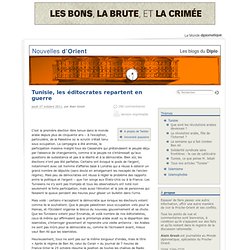
La campagne a été animée, la participation massive malgré tous les Cassandre qui prétendaient le peuple déçu par l’absence de changements, comme si le peuple ne s’intéressait qu’aux questions de subsistance et pas à la liberté et à la démocratie. Bien sûr, les élections n’ont pas été parfaites. Certains ont évoqué le poids de l’argent, notamment avec cet homme d’affaires basé à Londres qui a réussi à obtenir un grand nombre de députés (sans doute en amalgamant les rescapés de l’ancien régime). Mais peu de démocraties ont réussi à régler le problème des rapports entre la politique et l’argent – que l’on songe aux Etats-Unis ou à la France. Tunisia: The fall of President Ben Ali. Background note On January 14, 2011, President Zine el Abidine Ben Ali fled Tunisia after 23 years in power.
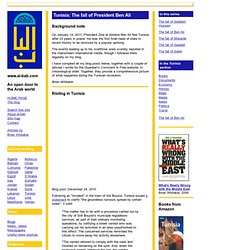
He was the first Arab head of state in recent history to be removed by a popular uprising. The events leading up to his overthrow were scantily reported in the mainstream international media, though I followed them regularly on my blog. I have compiled all my blog posts below, together with a couple of articles I wrote for the Guardian's Comment Is Free website, in chronological order.